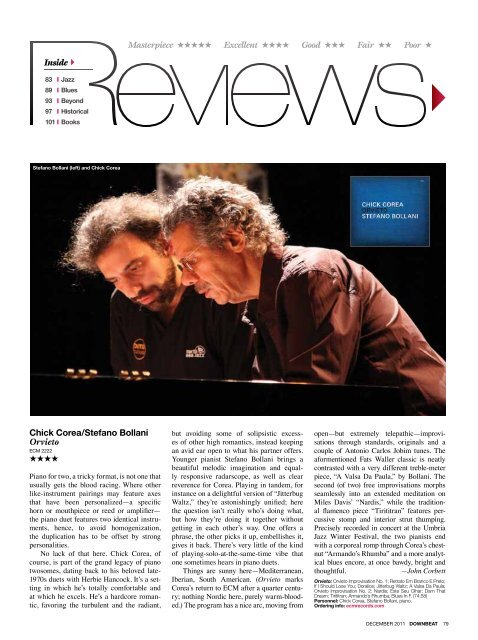Download - Downbeat
Download - Downbeat
Download - Downbeat
- No tags were found...
Create successful ePaper yourself
Turn your PDF publications into a flip-book with our unique Google optimized e-Paper software.
Masterpiece ★★★★★ Excellent ★★★★ Good ★★★ Fair ★★ Poor ★<br />
Inside <br />
83 I Jazz<br />
89 I Blues<br />
93 I Beyond<br />
97 I Historical<br />
101 I Books<br />
Stefano Bollani (left) and Chick Corea<br />
Chick Corea/Stefano Bollani<br />
Orvieto<br />
ECM 2222<br />
HHHH<br />
Piano for two, a tricky format, is not one that<br />
usually gets the blood racing. Where other<br />
like-instrument pairings may feature axes<br />
that have been personalized—a specific<br />
horn or mouthpiece or reed or amplifier—<br />
the piano duet features two identical instruments,<br />
hence, to avoid homogenization,<br />
the duplication has to be offset by strong<br />
personalities.<br />
No lack of that here. Chick Corea, of<br />
course, is part of the grand legacy of piano<br />
twosomes, dating back to his beloved late-<br />
1970s duets with Herbie Hancock. It’s a setting<br />
in which he’s totally comfortable and<br />
at which he excels. He’s a hardcore romantic,<br />
favoring the turbulent and the radiant,<br />
but avoiding some of solipsistic excesses<br />
of other high romantics, instead keeping<br />
an avid ear open to what his partner offers.<br />
Younger pianist Stefano Bollani brings a<br />
beautiful melodic imagination and equally<br />
responsive radarscope, as well as clear<br />
reverence for Corea. Playing in tandem, for<br />
instance on a delightful version of “Jitterbug<br />
Waltz,” they’re astonishingly unified; here<br />
the question isn’t really who’s doing what,<br />
but how they’re doing it together without<br />
getting in each other’s way. One offers a<br />
phrase, the other picks it up, embellishes it,<br />
gives it back. There’s very little of the kind<br />
of playing-solo-at-the-same-time vibe that<br />
one sometimes hears in piano duets.<br />
Things are sunny here—Mediterranean,<br />
Iberian, South American. (Orvieto marks<br />
Corea’s return to ECM after a quarter century;<br />
nothing Nordic here, purely warm-blooded.)<br />
The program has a nice arc, moving from<br />
open—but extremely telepathic—improvisations<br />
through standards, originals and a<br />
couple of Antonio Carlos Jobim tunes. The<br />
aformentioned Fats Waller classic is neatly<br />
contrasted with a very different treble-meter<br />
piece, “A Valsa Da Paula,” by Bollani. The<br />
second (of two) free improvisations morphs<br />
seamlessly into an extended meditation on<br />
Miles Davis’ “Nardis,” while the traditional<br />
flamenco piece “Tirititran” features percussive<br />
stomp and interior strut thumping.<br />
Precisely recorded in concert at the Umbria<br />
Jazz Winter Festival, the two pianists end<br />
with a corporeal romp through Corea’s chestnut<br />
“Armando’s Rhumba” and a more analytical<br />
blues encore, at once bawdy, bright and<br />
thoughtful. <br />
—John Corbett<br />
Orvieto: Orvieto Improvisation No. 1; Retrato Em Branco E Preto;<br />
If I Should Lose You; Doralice; Jitterbug Waltz; A Valsa Da Paula;<br />
Orvieto Improvisation No. 2; Nardis; Este Seu Olhar; Darn That<br />
Dream; Tirititran; Armando’s Rhumba; Blues In F. (74:58)<br />
Personnel: Chick Corea, Stefano Bollani, piano.<br />
Ordering info: ecmrecords.com<br />
DECEMBER 2011 DOWNBEAT 79
















